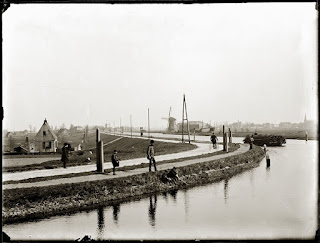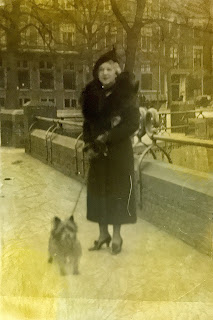Many languages in the family tree
 |
| From a Journal of poems, quotes and thoughts, created in 1881 by my great grandfather Jan Peelen for his daughter Annie. Three languages - German, Dutch and English. |
For the week 20 prompt - another language - I began by listing the languages spoken in my family tree. Several different languages appear, beginning with myself - Dutch and English. For my mother it is Dutch and some Malay, because she grew up in Java, Dutch East Indies, and this would be the same for my father. For both English appears as well and they would have learned this first at school and then later as adults because they lived and worked in English speaking countries. My mother also spoke German because her mother was German born.
Dutch was the language of my paternal grandparents and add to that later some Malay because they lived and worked in the Dutch East Indies until 1946. Although I am not sure if Malay is the right word. Should it be Javanese, or Indonesian, I wonder? I'll leave it for now as I proceed up the family tree.
My paternal grandfather, having attained a PhD in Pharmacy, I think would also have been quite fluent in German, because as I recall it, in the nineteenth and early twentieth century academic world it was the language of science.
My maternal grandmother was German born and of course was fluent in German. She married a Dutchman and adopted his language and I can see in her letters and diaries that she was very fluent and competent in her second language.
My maternal grandfather Rein Peelen grew up in the Rhineland, Germany, and so was fluent in both Dutch and German. I recall my mother telling me that he was also fluent in Javanese, which he had to learn for his work as a plantation manager in the Dutch East Indies. I have not confirmed this, but I think it was a subject that was included in the training for plantation management he would have completed in the Netherlands.
My paternal great grandparents would have spoken Dutch and possibly French as well because it was for a time an official language in nineteenth century Netherlands. In an earlier post about the census I noted that in the nineteenth century, records were in French as well as Dutch. I have not verified this exactly but I am basing this on my own experience and recollection. The Dutch education system I grew up with introduced French as an elective subject in the fourth year of primary school and from the first year of secondary school English was introduced as a core subject together with French. From the second year German was added as a core subject. This meant that in the second year of secondary school, at thirteen or fourteen years, one was learning three foreign languages as well as one's native language of Dutch. This was back in the 1960's, but it has changed again, so I don't know what the current situation is.
This would have been the same for my maternal great-grandparents who also were Dutch born. My great-grandfather Jan Peelen was also fluent in German, and I think he preferred to communicate in that language - most of his diaries are in German. My great-grandfather Reinier Scherius I suspect would have also added some of the local languages of the Dutch East Indies, from the areas where he was posted as a government official - Menado in the spice islands and Probolinggo in Java. German again for my great-grand parents Emil Reith and Marie Schumann.
I realised that what we now think of as Dutch is not the same language that prevailed in nineteenth century Netherlands. Modern Dutch or Standaard Nederlands - Standard Dutch, came into being as Algemeen Beschaafd Nederlands - General Civilised Netherlands, in the mid to late nineteenth century. It is a complex history and so I won't go into it further, other than to note it here.
The next generation up from my great-grandparents in the Netherlands would have more likely spoken a local variant or dialect of where they lived - Utrecht, Friesland, Drente, Overijssel. Of these, Friesland stands out as having its own language, Fries, which since 1956 is recognised as an official language in the Netherlands, thanks to agitation and activism in Leeuwarden, Friesland. (Reference: https://en.wikipedia.org/wiki/West_Frisian_language)
So the Lawerman and Beintema families who lived in the village Driesum in Friesland would have spoken some form of Frisian. Again on reading up on the history a complex story emerges. For now I just want to note a couple of "take home messages"; this language is the closest to English outside of Britain and between the end of the second world war and the 1970's the greatest number of migrants to Canada, the USA, Australia and New Zealand from the Netherlands came from the province of Friesland. (Reference: https://en.wikipedia.org/wiki/West_Frisian_language )
On the German side of my family, that is the Reith and Schumann families, who I have traced so far to the province of Hesse, it is not a simple story either. They would have spoken a variant of Hessian German, which in turn is a variant of the Rhenish Franconian dialects. (Reference: https://en.wikipedia.org/wiki/Hessian_dialects)
So to cut a long story short - in essence all the languages spoken in my family tree (except for any South East Asian languages) are from the Germanic Language group and this again is a member of the large Indo European Languages Family. Simple really.




Comments
Post a Comment